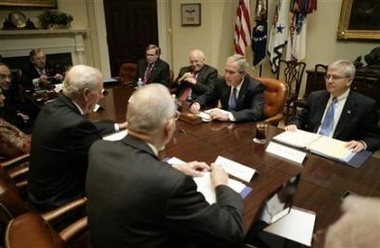Iraq panel to recommend troops pullout
(Reuters)Updated: 2006-11-30 12:56
WASHINGTON - The independent panel studying US policy in Iraq has unanimously agreed to a report that will call for a gradual pullback of American combat troops in Iraq but stops short of setting a firm timetable for withdrawal, The New York Times reported on Wednesday.
Citing people familiar with the panel's deliberations, the Times said the Iraq Study Group will recommend that Bush make it clear that he would start the troop withdrawal "relatively soon," indicating sometime next year.
That recommendation would be a compromise between calls from some Democrats for a timetable to withdraw the nearly 140,000 U.S. forces in Iraq and Bush's insistence that forces should remain until the mission to stabilize Iraq was completed.
The Times said the report did not state whether the 15 combat brigades making up most of the U.S. fighting forces in Iraq would be brought home or pulled back to bases in Iraq or neighboring countries.
But the pullback of the 15 combat brigades could still leave more than 70,000 American trainers, logistics experts and members of a rapid reaction force in Iraq, the Times said.
Recommendations of panel, which is co-chaired by former Secretary of State James Baker -- a close Bush family friend -- and former Democratic congressman Lee Hamilton -- are just advisory. But a unanimous recommendation will be much harder for Bush to resist than if the group were divided, experts and study group advisers say.
Hamilton earlier told the liberal Center for American Progress: "We reached a consensus," but gave no details.
Bush is under mounting political pressure to change policies in Iraq. His fellow Republicans lost control of the U.S. Congress earlier this month largely because of public dissatisfaction over the war. Since the March 2003 U.S.-led invasion that toppled Saddam Hussein, 2,885 U.S. force members have died.
Much of the Iraq Study Group's report focused on recommending a more aggressive U.S. diplomatic initiative in the Middle East, including directly engaging Iran and Syria, the newspaper said.
Those contacts could start with a regional conference on Iraq or broader Middle East issues such as the Israeli-Palestinian situation, it said.
The Bush administration, which accuses Iran and Syria of fueling the insurgency in Iraq, has been reluctant to hold talks with either government. Iran and Syria have denied fanning the violence.
In his earlier remarks, Hamilton made a strong case for America talking with its adversaries, which Bush has resisted in the cases of Syria and Iran.
"I don't see how you solve problems" without talking, Hamilton said.
|
||
|
||
|
|

